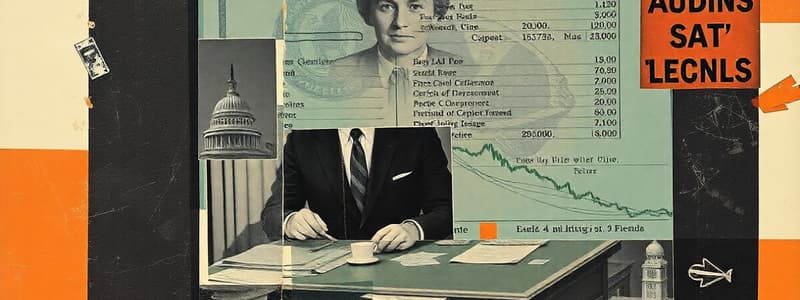Podcast
Questions and Answers
What is one of the actions an auditor must take when attending a physical inventory count?
What is one of the actions an auditor must take when attending a physical inventory count?
- Randomly select items for immediate sale
- Conduct interviews with all employees present
- Prepare a financial statement draft
- Evaluate management’s instructions for counting (correct)
If an auditor cannot attend the physical inventory count on the planned date, what should they do?
If an auditor cannot attend the physical inventory count on the planned date, what should they do?
- Prepare a report based on prior year’s data
- Attend a later date and perform audit procedures (correct)
- Skip the inventory procedures entirely
- Request an extension from management
What should an auditor do if attendance at the physical inventory is impracticable?
What should an auditor do if attendance at the physical inventory is impracticable?
- Obtain audit evidence through alternative procedures (correct)
- Wait for the next audit period
- Send a letter to inventory management
- Assume that the inventory is accurate
What may occur if the auditor cannot obtain sufficient appropriate evidence about inventory?
What may occur if the auditor cannot obtain sufficient appropriate evidence about inventory?
What is the first step an auditor should take to identify potential litigation and claims involving the entity?
What is the first step an auditor should take to identify potential litigation and claims involving the entity?
How can an auditor obtain evidence regarding inventory in the custody of a third party?
How can an auditor obtain evidence regarding inventory in the custody of a third party?
When conducting an audit, what should the auditor do if they assess a risk of material misstatement regarding litigation?
When conducting an audit, what should the auditor do if they assess a risk of material misstatement regarding litigation?
What is included in a letter of general inquiry sent to the entity's external legal counsel?
What is included in a letter of general inquiry sent to the entity's external legal counsel?
What should an auditor do if they suspect the external legal counsel will not appropriately respond to a letter of general inquiry?
What should an auditor do if they suspect the external legal counsel will not appropriately respond to a letter of general inquiry?
Which of the following is NOT a method for the auditor to identify litigation and claims?
Which of the following is NOT a method for the auditor to identify litigation and claims?
What happens if management refuses to allow the auditor to communicate with the entity's lawyers?
What happens if management refuses to allow the auditor to communicate with the entity's lawyers?
What kind of information should a letter of specific inquiry request from the external legal counsel?
What kind of information should a letter of specific inquiry request from the external legal counsel?
Which factor increases the risk of material misstatement when accounting estimates are involved?
Which factor increases the risk of material misstatement when accounting estimates are involved?
What is the main responsibility of management regarding accounting estimates?
What is the main responsibility of management regarding accounting estimates?
Which type of letter is prepared by management and sent by the auditor to request information from external legal counsel?
Which type of letter is prepared by management and sent by the auditor to request information from external legal counsel?
What should an auditor do first if management refuses to allow confirmation requests?
What should an auditor do first if management refuses to allow confirmation requests?
How should the auditor assess the implications of management's refusal of confirmation requests?
How should the auditor assess the implications of management's refusal of confirmation requests?
What does PSA 540 require the auditor to obtain regarding accounting estimates?
What does PSA 540 require the auditor to obtain regarding accounting estimates?
Which characteristic must an estimate possess to be considered reasonable in circumstances?
Which characteristic must an estimate possess to be considered reasonable in circumstances?
What should auditors consider when planning the nature, timing, and extent of audit procedures related to accounting estimates?
What should auditors consider when planning the nature, timing, and extent of audit procedures related to accounting estimates?
What should the auditor perform to obtain relevant and reliable audit evidence if management refuses confirmations?
What should the auditor perform to obtain relevant and reliable audit evidence if management refuses confirmations?
Under what circumstance is a 100% examination necessary?
Under what circumstance is a 100% examination necessary?
Which of the following is a method of selecting specific items for testing?
Which of the following is a method of selecting specific items for testing?
What is the purpose of audit sampling?
What is the purpose of audit sampling?
Which type of audit evidence is generally considered the least reliable?
Which type of audit evidence is generally considered the least reliable?
If audit evidence from one source is inconsistent with another, what must the auditor do?
If audit evidence from one source is inconsistent with another, what must the auditor do?
When is audit evidence more reliable?
When is audit evidence more reliable?
What is a reason for conducting a 100% examination of a population?
What is a reason for conducting a 100% examination of a population?
Which of the following statements about reliability of audit evidence is correct?
Which of the following statements about reliability of audit evidence is correct?
What constitutes audit evidence in the auditor's opinion formation process?
What constitutes audit evidence in the auditor's opinion formation process?
Which of the following is NOT typically considered an accounting record?
Which of the following is NOT typically considered an accounting record?
When evaluating the work of a management’s expert, which of the following is NOT a required consideration for the auditor?
When evaluating the work of a management’s expert, which of the following is NOT a required consideration for the auditor?
What should the auditor primarily assess regarding the information produced by the entity?
What should the auditor primarily assess regarding the information produced by the entity?
Which of the following is an example of 'other information' that can be used as audit evidence?
Which of the following is an example of 'other information' that can be used as audit evidence?
What aspect should the auditor evaluate regarding the relevance and reliability of information used as audit evidence?
What aspect should the auditor evaluate regarding the relevance and reliability of information used as audit evidence?
Which of the following records would best support cost allocations in auditing?
Which of the following records would best support cost allocations in auditing?
What is essential for the auditor to consider when designing audit procedures?
What is essential for the auditor to consider when designing audit procedures?
Flashcards are hidden until you start studying
Study Notes
Litigation and Claims
- Auditors need to identify litigation and claims that may materially misstate the financial statements.
- Auditors may inquire of management and legal counsel, review meeting minutes and legal expense accounts to assess risks and identify relevant events.
- If a risk of material misstatement is identified, auditors should send a letter of general inquiry to the entity's external legal counsel to confirm the existence and implications of litigation and claims.
- A letter of specific inquiry may be needed if external legal counsel is unlikely to respond to a general inquiry.
- Refusal from management to allow communication with the entity's lawyer can restrict the audit scope and result in a qualified audit opinion or a disclaimer of opinion.
- If management refuses to allow the auditor to request a confirmation, the auditor should inquire about the reasons, evaluate the implications of the refusal, and perform alternative procedures to obtain evidence.
Auditing Accounting Estimates
- An accounting estimate is an approximation of an amount when a precise measurement is unavailable.
- Management is responsible for making accounting estimates and disclosures.
- The risk of material misstatement is higher when accounting estimates are involved.
- The auditor should ensure accounting estimates are reasonable, properly accounted for, and appropriately disclosed.
- To assess the reasonableness of an estimate, the auditor should consider the objectivity, historical patterns, and consistency with industry guidelines of the assumptions involved.
Audit Evidence – Specific Considerations for Selected Items
-
Inventory: Auditors perform physical inventory counting to obtain sufficient evidence regarding inventory existence and condition, and review the final inventory records for accuracy.
-
For inventory held by third parties, auditors may request confirmation from the third party or perform inspection procedures.
-
Sampling Methods:
- 100% examination may be appropriate for smaller populations, significant risks, or repetitive tasks.
- Specific items, such as high-value items or those over a certain amount, can be selected.
- Audit sampling is used to draw conclusions about a population based on a sample selected from it.
-
Reliability of Audit Evidence:
- Evidence from independent sources is more reliable than internal evidence.
- Evidence generated internally is more reliable when controls are effective.
- Direct observation is more reliable than indirect or inferred evidence.
- Documentary evidence is more reliable than oral representations.
Gathering Audit Evidence
- Auditors gather sufficient and appropriate audit evidence to support their opinion on the financial statements.
- Audit evidence can be obtained from accounting records, supporting documents (invoices, contracts), and other information (meeting minutes, confirmations, analysts' reports, benchmarking data, control manuals).
- The auditor should consider the relevance and reliability of the evidence when designing and performing procedures.
- When using work produced by management's expert, the auditor should evaluate the expert's competence, capabilities, and objectivity.
- When using information produced by the entity, the auditor should evaluate its accuracy, completeness, precision, and detail for the audit's purposes.
Studying That Suits You
Use AI to generate personalized quizzes and flashcards to suit your learning preferences.




